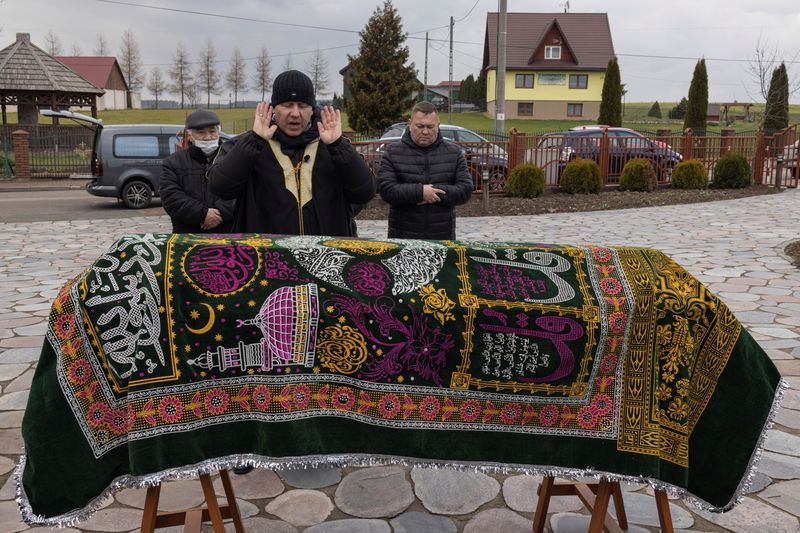
Members of the local Tatar Muslim community attend a funeral of the unnamed African migrant, a victim of a migrant crisis on the country’s border with Belarus, in the village of Bohoniki near Sokolka, Poland, November 18, 2021. REUTERS/Marko Djurica
November 18, 2021
BOHONIKI, Poland (Reuters) – In a grave decorated with branches and surrounded by stones, an unnamed migrant was laid to rest in a Muslim cemetery in north east Poland on Thursday, a recent victim of a migrant crisis on the country’s border with Belarus but not the last.
The funeral in the village of Bohoniki of a man thought to have travelled from Africa was the second such ceremony organised this week by the local Tatar Muslim community.
On Monday they buried a 19-year-old Syrian, drowned in a river last month while trying to cross to the European Union from Belarus.
“It is hard,” said Maciej Szczesnowicz, a leader of the local Tatar Muslim community. “It pains me that people went to another country… and met such a fate in here Poland.”
The European Union says Minsk flew in thousands of migrants from transit hubs in the Middle East and pushed them to cross illegally into the bloc in order to put pressure on Europe in retaliation for sanctions imposed against Belarus over human rights abuses. Belarus denies this.
While Polish authorities had been unable to establish the identity of the man, Szczesnowicz said he had been with a group of Muslim migrants and that a post-mortem had shown he was around 30 years old.
The man’s grave was marked with a plaque bearing the letters NN for an anonymous person and giving the date of death as Oct. 22.
Szczesnowicz said another migrant funeral was planned for Friday. “There will either be one coffin or two, we will see,” he said.
A small ethnic and religious minority in overwhelmingly homogenous and Catholic modern Poland, the Tatars descend from warriors who were rewarded with land by Polish kings for protecting the country’s eastern border centuries ago.
The community has been delivering clothes and food to both migrants and Polish troops on the border.
(Reporting by Alan Charlish, Marko Djurica and Fejda Grulovic; editing by Philippa Fletcher)

